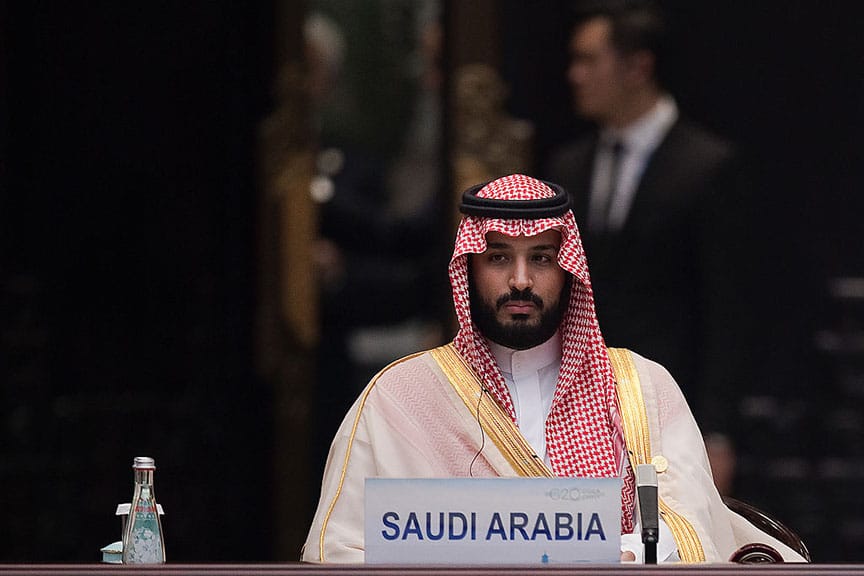 Saudi Arabia Deputy Crown Prince Mohammed bin Salman attends the G20 opening ceremony at the Hangzhou International Expo Center on September 4, 2016 in Hangzhou, China. (Photo by Nicolas Asfouri – Pool/Getty Images)
Saudi Arabia Deputy Crown Prince Mohammed bin Salman attends the G20 opening ceremony at the Hangzhou International Expo Center on September 4, 2016 in Hangzhou, China. (Photo by Nicolas Asfouri – Pool/Getty Images) Throughout the Cold War, a succession of U.S. presidents were criticized for the alliances they formed with countries notorious for their abuses of basic human rights. Leaders in both parties usually defended these partnerships by arguing that the global challenges created by our country’s adversarial relationship with the Soviet Union necessitated friendships with some very bad actors.
After the Berlin Wall fell and the international landscape became less balkanized, human rights became a higher priority in U.S. foreign policy. Tensions with China, Iran and North Korea, to name a few of America’s most menacing geopolitical irritants, still pressure American decisionmakers to team up with noted abusers, but these considerations have not been as major a determinant in our country’s diplomacy as was the case for the second half of the twentieth century.
But when Vladimir Putin invaded Ukraine, the world began to look a lot like it did during the heyday of the USSR. When it was reported last week that President Joe Biden is considering a meeting with Saudi Arabia’s de facto leader Crown Prince Mohammed bin Salman (MBS) sometime this summer, it became clear that Biden’s own concerns about MBS’ human rights record were taking a back seat to other more pressing matters stemming from the Russia-Ukraine conflict.
During his presidential campaign, Biden vowed to turn Saudi Arabia into a “pariah” on the world stage. Shortly after taking office, Biden’s administration released a previously classified document blaming the crown prince for the gruesome murder of columnist Jamal Khashoggi. Since then, Biden has refused to communicate with MBS, speaking only with his father, King Salman bin Abdulaziz, the country’s ailing and titular head of state. The Saudis are also angry at the U.S. for reducing involvement in Yemen, where Saudi forces are facing increased attacks from Iranian-backed rebels and for Biden’s State Department’s ongoing pursuit of a new nuclear agreement with Iran.
It’s not clear if the U.S. still has the luxury of basing its foreign policy on high-minded considerations. There’s a war to win now, not to mention a midterm election just around the corner.
These extremely tense relationships between U.S. and Saudi leaders were a relatively low-level concern until the Russian invasion of Ukraine. Given Europe’s dependence on Russian oil, and the skyrocketing cost of gasoline in this country, Saudi Arabia’s massive energy resources have suddenly become much more important to Biden. But when he reached out to Saudi Arabia and the United Arab Emirates earlier this spring to request that the two countries increase the amount of oil they would sell on world markets to decrease the impact of the potential loss of Russian energy exports, he was not only rejected but ignored altogether. As successful as Biden has been at uniting NATO behind Ukraine, the leader of the free world could not even get his calls returned.
As the midterm elections draw closer, it’s become clear that Biden’s greatest domestic political obstacle is voter concern about ongoing inflation. While prices for food, rent and other goods are extremely high as well, the cost of gasoline is advertised very prominently on street corners throughout the country. So the psychological impact of gas prices on the American consumer is disproportionately harsh. Biden needs the price of gasoline to come down as quickly as possible, and the person best positioned to make that happen is Mohammed bin Salman.
In addition to Khashoggi’s murder, Biden has harshly criticized the Saudi record on other human rights issues such as their treatment of domestic dissidents. He had promised a more confrontational approach with that country than the amicable relations that his predecessor maintained. So White House leaks that Biden and MBS might be meeting in person in the near future suggest that the U.S. president has decided that a helping of humble pie might be on the White House menu before too long.
Saudi Arabia’s human rights shortcomings have not improved over the last few months, nor are they any more excusable. But just as was the case when Putin’s Soviet ancestors were in power, it’s not clear if the U.S. still has the luxury of basing its foreign policy on such high-minded considerations. There’s a war to win now, not to mention a midterm election just around the corner.
Dan Schnur is a Professor at the University of California – Berkeley, USC and Pepperdine. Join Dan for his weekly webinar “Politics in the Time of Coronavirus” (www/lawac.org) on Tuesdays at 5 PM.





















 More news and opinions than at a Shabbat dinner, right in your inbox.
More news and opinions than at a Shabbat dinner, right in your inbox.